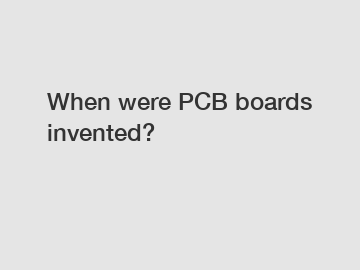When were PCB boards invented?
PCB boards, or printed circuit boards, have become an integral part of modern technology. These compact and efficient boards are used in everything from our smartphones and laptops to our cars and kitchen appliances. But have you ever stopped to wonder when these essential components were first invented?
The history of PCB boards dates back to the early 20th century, with the first patent for a printed wire board being filed in 1925 by Charles Ducas. However, it wasn't until the 1940s and 1950s that PCB boards as we know them today started to gain popularity and widespread use.
During World War II, the United States military was looking for a more efficient way to build electronic circuits for their radar systems and other equipment. The traditional method of hand-soldering components onto a chassis was time-consuming and prone to errors. This led to the development of the first true printed circuit boards, which allowed for quicker assembly and more reliable connections.

One of the key figures in the development of PCB boards was Paul Eisler, an Austrian engineer who is often credited with inventing the modern PCB. In 1943, Eisler created a PCB for a radio transmitter while working for the British Admiralty. This groundbreaking technology allowed for a more compact and lightweight design, making it ideal for military applications.
After the war, the use of PCB boards quickly spread to the commercial sector. Companies like IBM and RCA began using PCBs in their computer systems, leading to a boom in the electronics industry. By the 1960s, PCBs had become the standard method for connecting electronic components in nearly all types of devices.
The invention of PCB boards revolutionized the electronics industry in several ways. Firstly, PCBs allowed for a much higher level of automation in the manufacturing process. Instead of hand-soldering each component onto a circuit board, machines could now quickly and accurately place components on pre-designed PCBs.
Secondly, PCB boards helped to make electronic devices smaller and lighter. By creating compact circuits that were layered onto a single board, PCBs allowed for more complex electronics to be housed in smaller spaces. This was essential for the development of portable devices like smartphones and laptops.
Another key advantage of PCB boards is their reliability. By using a printed circuit board, manufacturers could ensure consistent connections between components, reducing the risk of short circuits or other electrical failures. This reliability is crucial in industries like aerospace and medical devices, where even a small error could have catastrophic consequences.
Today, PCB boards continue to evolve as technology advances. New materials and manufacturing techniques allow for even smaller circuits and more complex designs. Multilayer PCBs, where circuits are layered on top of each other, are becoming increasingly common in high-tech devices like 5G smartphones and autonomous vehicles.
As a leading provider of PCB boards, our company has been at the forefront of these advancements. With a team of highly skilled engineers and state-of-the-art manufacturing facilities, we are able to produce top-quality PCBs for a wide range of industries. Our boards are used in everything from consumer electronics to medical devices, and we take great pride in the role we play in advancing technology.
In conclusion, the invention of PCB boards has had a profound impact on the electronics industry. From their humble beginnings in military radar systems to their widespread use in today's high-tech devices, PCBs have revolutionized the way we build and connect electronic circuits. As technology continues to evolve, so too will the design and capabilities of PCB boards. And we look forward to being at the forefront of these exciting developments.
If you want to learn more, please visit our website automotive pcb design , Industrial Control PCB Manufacturer, consumer electronics pcb .


